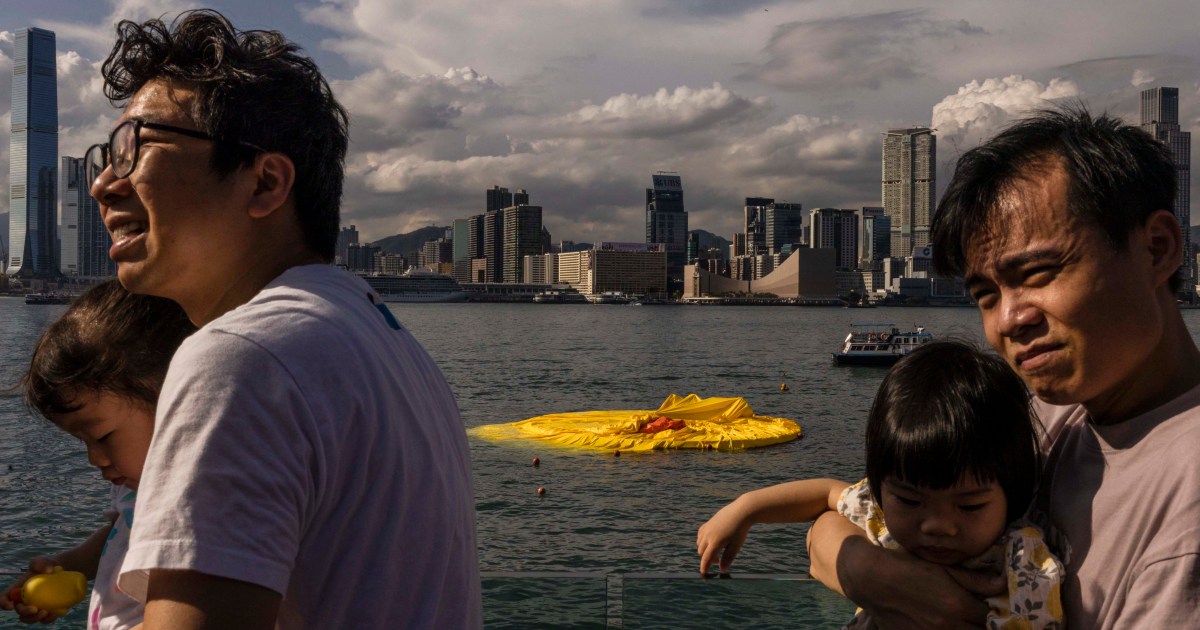
More than 250 people have been arrested under the legislation, including 47 pro-democracy politicians and activists who have mostly been held without bail for more than two years.
Authorities say the law, which criminalizes secession, subversion, terrorism and collusion with foreign forces and is punishable by life in prison, was necessary to restore stability.
The government crackdown has sent Hong Kong, long considered one of the freest societies in Asia, plummeting in rankings such as the New Zealand-based Human Rights Measurement Initiative, which said last week that the city had fallen 33% on its freedom of expression index since 2019.
Happiness is also falling, with families reporting an average score of 6.57 out of 10 compared with 7.26 in 2021, The South China Morning Post reported Wednesday, citing a recent poll by the Hong Kong Family Happiness Index, by the nonprofit group HK.WeCARE. The poll of 1,356 people also found the biggest drop was among people ages 19 to 24, whose score fell to 6.09 from 6.91 in 2022.
There is a feeling of dejection among Hong Kong residents because “they’re used to having certain things and it’s been taken away,” said Kevin Yam, a Hong Kong lawyer and democracy activist who lives in Australia.
“A ‘Happy Hong Kong’ campaign should be one where Hong Kong is reversing course and gets some of its freedoms back,” he said.
Government authorities strongly object to such criticism, saying Hong Kong is governed by the rule of law.
In a speech on Saturday marking the 26th anniversary of Hong Kong’s return to Chinese sovereignty, Chief Executive John Lee, the city’s top leader, said Hong Kong was quickly returning to normalcy and that he was focused on pragmatic efforts and delivering results.
Lee, who has been in office for one year, said his government would “strive to gain trust through action, narrow gaps with results, and build mutual trust through achievements, in a bid to unite all sectors of the community.”
While Hong Kong is now “largely stable,” Lee said, “we know that we are intentionally targeted and oppressed by some countries” that have misjudged China’s “peaceful development.”
He called for continued vigilance against “destructive forces using ‘soft resistance’” still lurking in the city.
Irrevocable change
It was only in March that Hong Kong lifted the last of “zero-Covid” restrictions that had cut it off from the world, allowing residents to venture outside without masks for the first time in more than 1,000 days.
The city has quickly shown signs of revival: Last Thursday, a public holiday, Hong Kong’s iconic Dragon Boat festival races were held normally for the first time since before the pandemic.
The economy grew 2.7% in the first quarter of this year, after four consecutive quarters of contraction. Finance Secretary Paul Chan said Thursday that business activity in the catering sector and the value of Hong Kong’s retail sales had both returned to about 90% of their levels before the pandemic.
Tourists are also returning, even as airlines struggle to restore flights they had slashed.
“I think Hong Kong is coming back after three years of Covid,” said Tony Chan, a tourist from France whose family is originally from Hong Kong. “I see a lot of mainland China coming back, which is good news.”
Even as the “old” Hong Kong comes back in some ways, in others it is changing irrevocably.
Last week, the Hong Kong Public Opinion Research Institute, a polling organization, said it would cancel about a quarter of its regular survey questions and refrain from publishing the results from some others, including questions about the 1989 Tiananmen Square crackdown on pro-democracy demonstrators in Beijing, citing “suggestions” from the government.
The Hong Kong Police Force declined to comment on the institute’s decision, saying residents can enjoy the rights and freedoms guaranteed under Hong Kong’s mini-constitution “as long as they are not in violation of the law.”
The June 4 anniversary of the Tiananmen crackdown, which Hong Kong marked for more than 30 years with a candlelight vigil that drew tens of thousands of people, was once again a subdued affair last month as police came out in force. Victoria Park, where the annual vigils had been held, was occupied instead by a carnival organized by pro-Beijing groups, and for the second year in a row, the local Catholic diocese did not hold a memorial Mass.
Government officials have not said whether it is still legal to peacefully commemorate the anniversary of the crackdown, saying only that everyone must follow the law.






